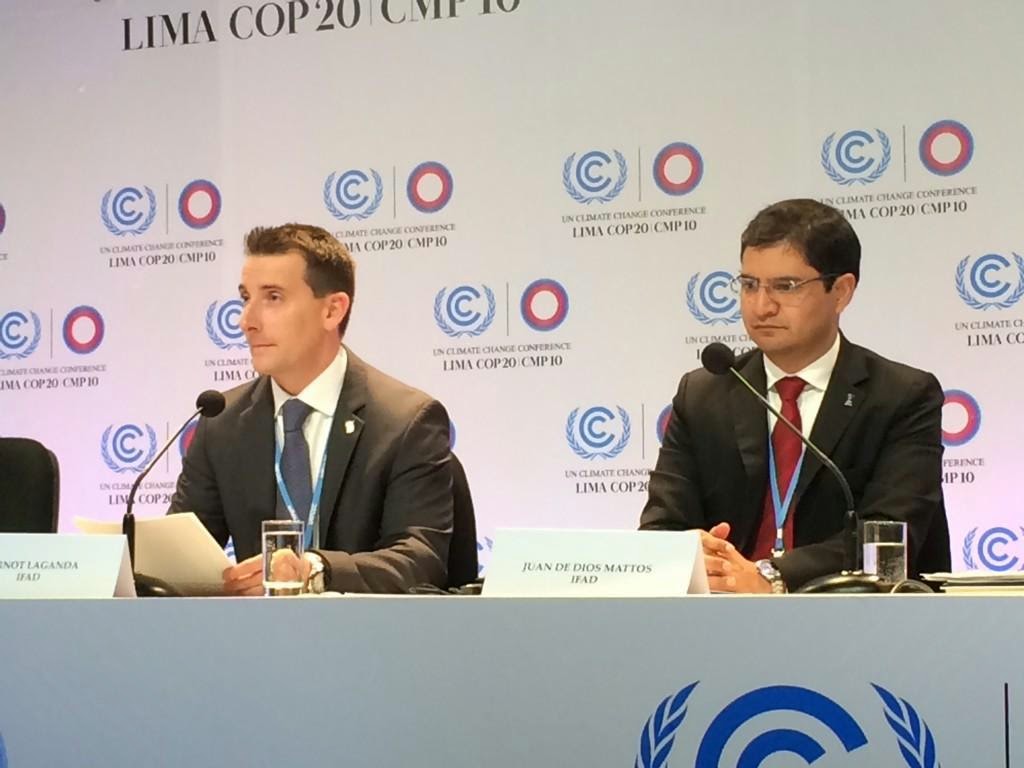 |
| IFAD's Gernot Laganda (left) and Juan de Dios Mattos at a 3 December press conference in Lima. |
Just ahead of the halfway point in negotiations at the 20th Conference of Parties (COP20) of the UN Framework Convention on Climate Change in Lima, Peru, we talk to Gernot Laganda, who is heading up IFAD's delegation, to ask him some questions on developments at the conference. Laganda is Lead Technical Specialist in IFAD's Environment and Climate Division.
Q: COP20 is the foremost and final opportunity for nations to draft an agreement on climate change before a definitive commitment at the next UN climate summit in Paris, in 2015. What is the general feeling at COP this year and how are negotiations progressing?
A: I believe there is a unanimous agreement that the hope for Paris should not be so high. There are reasons to be more optimistic, especially after the agreement between China and the United States on reducing their greenhouse gas emissions. However, we will not likely be able to manage these emission reductions in order to remain below the 2 degrees Celsius threshold. We are locked into a future that is at least 2 degrees warmer and we cannot rely on international negotiations to keep us below that threshold. Paris will not be that turning point that everybody wants it to be, but we are definitely taking a good step in the right direction.
Q: The COP President said at this year’s opening speech that last year's Warsaw climate summit will be remembered as the COP where all Parties made the process transparent and laid solid foundations for the new agreement. After that, the process moved on, and it was a very busy year marked by some significant landmarks, such as the UN Secretary-General's Climate Summit, which had the largest number of leaders in history pledging action to fight climate change. Secretary-General Ban Ki-moon himself praised us for building the foundations of the new agreement. Where does that leave us now?
A: I would say that the sense of urgency has definitely increased in the past year. This happened mainly because many countries are now experiencing climate change in their own front yard. Droughts, floods and storms are occurring [more frequently] even in countries that hadn’t experienced this before, such as the United States. There is political awareness and a realization that we have the technologies in place to make a difference. However, the economic interests linked to issues such as fossil fuels, do not make the process easier.
Q: Is Agriculture being discussed at COP20?
A: So far, agriculture has not been on the agenda, which shows how this issue is still a “hot potato” as agriculture is on one side a contributor to climate change and on the other side a sector that is highly affected by it. Many delegates here would like to see agriculture being discussed from an adaptation angle and we in IFAD strongly agree, as we support climate-smart agriculture and would like to see the COP go in this same direction.
Q: What is the key message you would like to send out at COP20?
A: The message that IFAD has been promoting for a long time in the context of the climate negotiations is that if we want to solve the problem of climate change, we must not forget about smallholder farmers. They are very closely linked to the ecosystems that we need to protect, to the value chains that produce income for national economies, and to the possibility of reducing the carbon footprint of agriculture. Smallholder farmers are an important part of the solution to climate change as they can help us transform the agriculture system in a climate-smart way with higher productivity, higher resilience and lower carbon footprint.